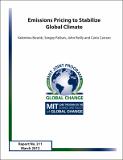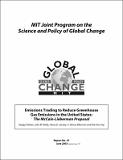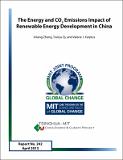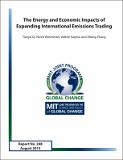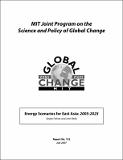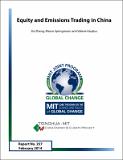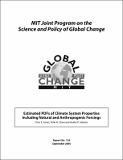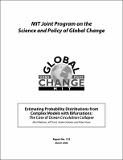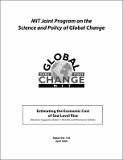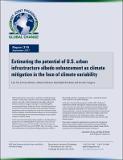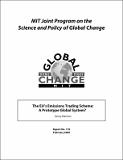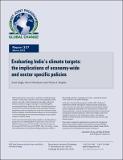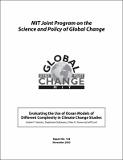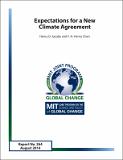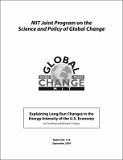Browsing Joint Program on the Science and Policy of Global Change Reports by Title
Now showing items 104-123 of 329
-
Emissions Pricing to Stablize Global Climate
(MIT Joint Program on the Science and Policy of Global Change, 2012-03)In the absence of significant greenhouse gas (GHG) mitigation, many analysts project that atmospheric concentrations of species identified for control in the Kyoto protocol could exceed 1000 ppm (carbon-dioxide-equivalent) ... -
Emissions trading to reduce greenhouse gas emissions in the United States : the McCain-Lieberman Proposal
(2003-06)The Climate Stewardship Act of 2003 (S. 139) is the most detailed effort to date to design an economy-wide cap-and-trade system for US greenhouse gas emissions reductions. The Act caps sectors at their 2000 emissions in ... -
Emulating maize yields from global gridded crop models using statistical estimates
(MIT Joint Program on the Science and Policy of Global Change, 2015-03)This study estimates statistical models emulating maize yield responses to changes in temperature and precipitation simulated by global gridded crop models. We use the unique and newly-released Inter-Sectoral Impact ... -
The Energy and CO2 Emissions Impact of Renewable Energy Development in China
(MIT Joint Program on the Science and Policy of Global Change, 2013-04)China’s recently-adopted targets for developing renewable electricity—wind, solar, and biomass—would require expansion on an unprecedented scale in China and relative to existing global installations. An important question ... -
The Energy and Economic Impacts of Expanding International Emissions Trading
(MIT Joint Program, 2013-08-21)Emissions trading systems are recognized as a cost-effective way to facilitate emissions abatement and are expected to play an important role in international cooperation for global climate mitigation. Starting from the ... -
Energy Conservation in the United States: Understanding its Role in Climate Policy
(MIT Joint Program on the Science and Policy of Global Change, 2006-08)Efforts to reduce carbon emissions significantly will require considerable improvements in energy intensity, the ratio of energy consumption to economic activity. Improvements in energy intensity over the past thirty years ... -
Energy Scenarios for East Asia: 2005-2025
(MIT Joint Program on the Science and Policy of Global Change, 2007-06)We describe several scenarios for economic development and energy use in East Asia based on the MIT Emissions Prediction and Policy Analysis (EPPA) model, a computable general equilibrium model of the world economy. Historic ... -
Equity and Emissions Trading in China
(MIT Joint Program on the Science and Policy of Global Change, 2014-02)China has embarked on an ambitious pathway for establishing a national carbon market in the next five to ten years. In this study, we analyze the distributional aspects of a Chinese emissions-trading scheme from ethical, ... -
Estimated PDFs of Climate System Properties Including Natural and Anthropogenic Forcings
(MIT Joint Program on the Science and Policy of Global Change, 2005-09)We present revised probability density functions (PDF) for climate system properties (climate sensitivity, rate of deep-ocean heat uptake, and the net aerosol forcing strength) that include the effect on 20th century ... -
Estimating Probability Distributions from Complex Models with Bifurcations: The Case of Ocean Circulation Collapse
(MIT Joint Program on the Science and Policy of Global Change, 2006-03)Studying the uncertainty in computationally expensive models has required the development of specialized methods, including alternative sampling techniques and response surface approaches. However, existing techniques for ... -
Estimating the Economic Cost of Sea-Level Rise
(MIT Joint Program on the Science and Policy of Global Change, 2008-04)To improve the estimate of economic costs of future sea-level rise associated with global climate change, this report generalizes the sea-level rise cost function originally proposed by Fankhauser, and applies it to a ... -
Estimating the potential of U.S. urban infrastructure albedo enhancement as climate mitigation in the face of climate variability
(MIT Joint Program on the Science and Policy of Global Change, 2017-09)The climate mitigation potential of U.S. urban infrastructure albedo enhancement is explored using multidecadal regional climate simulations. Increasing albedo from 0.2 to 0.4 results in summer daytime surface temperature ... -
The European Carbon Market in Action: Lessons from the First Trading Period Interim Report
(MIT Joint Program on the Science and Policy of Global Change, 2008-06)The European Union Emissions Trading Scheme (EU ETS) is the largest greenhouse gas market ever established. The European Union is leading the world's first effort to mobilize market forces to tackle climate change. A precise ... -
The EU’s Emissions Trading Scheme: A Prototype Global System?
(MIT Joint Program on the Science and Policy of Global Change, 2009-02)The European Union's Emission Trading Scheme (EU ETS) is the world's first multinational cap-and-trade system for greenhouse gases. As an agreement between sovereign nations with diverse historical, institutional, and ... -
Evaluating India’s climate targets: the implications of economy-wide and sector specific policies
(MIT Joint Program on the Science and Policy of Global Change, 2018-03)We employ a numerical economy-wide model of India with energy sector detail to simulate the impact of India’s commitments to the Paris Climate Agreement. We simulate targets for reducing CO2 emissions intensity of GDP via ... -
Evaluating the Use of Ocean Models of Different Complexity in Climate Change Studies
(MIT Joint Program on the Science and Policy of Global Change, 2005-11)The study of the uncertainties in future climate projections requires large ensembles of simulations with different values of model characteristics that define its response to external forcing. These characteristic include ... -
The evolution of a climate regime: Kyoto to Marrakech
(MIT Joint Program on the Science and Policy of Global Change, 2002-02)At meetings in Bonn and Marrakech in 2001, the Conference of the Parties to the Framework Convention on Climate Change broke through an impasse on the detailed provisions needed to allow the Kyoto Protocol to enter into ... -
Exclusionary manipulation of carbon permit markets: a laboratory test
(MIT Joint Program on the Science and Policy of Global Change, 2002-11)The experiment reported here tests the case of so-called exclusionary manipulation of emission permit markets, i.e., when a dominant firm -- here a monopolist -- increases its holding of permits in order to raise its rivals' ... -
Expectations for a New Climate Agreement
(MIT Joint Program on the Science and Policy of Global Change, 2014-08)With the objective of stimulating timely and open discussion of the current attempt to formulate a new climate agreement—to be reached at the 21st meeting of the Conference of Parties (COP-21) in Paris during November of ... -
Explaining Long-Run Changes in the Energy Intensity of the U.S. Economy
(MIT Joint Program on the Science and Policy of Global Change, 2004-09)Recent events have revived interest in explaining the long-run changes in the energy intensity of the U.S. economy. We use a KLEM dataset for 35 industries over 39 years to decompose changes in the aggregate energy-GDP ...
